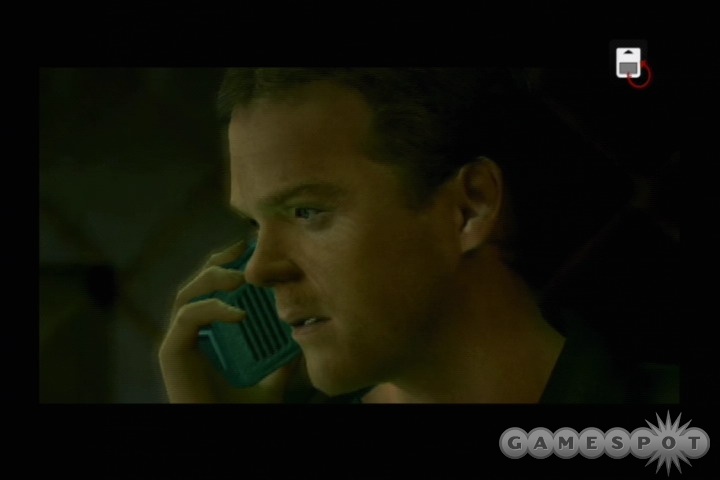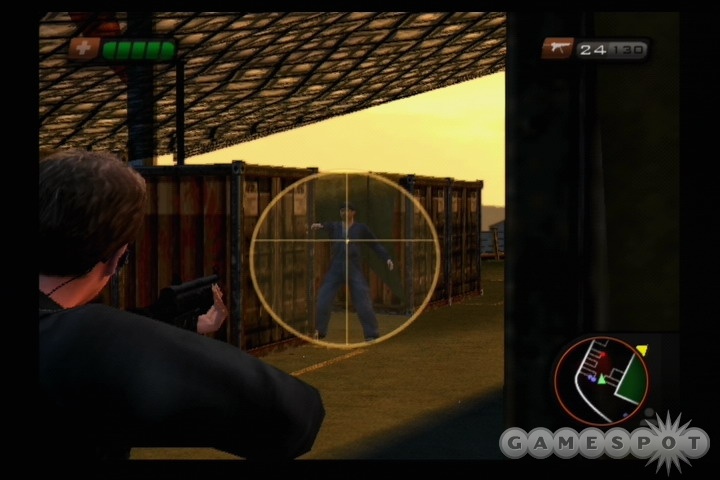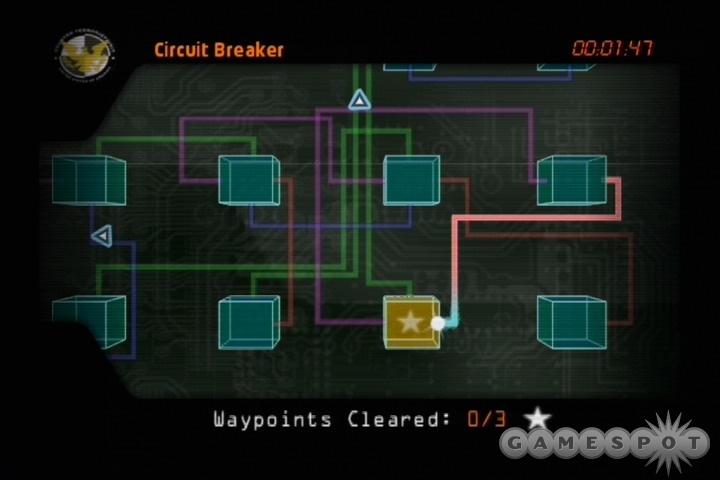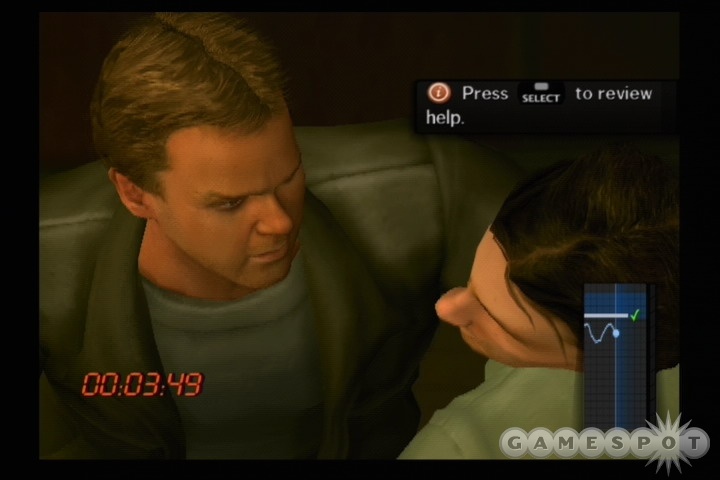As far as hard-boiled, TV action drama goes, Fox's 24 rules the roost. The show is wildly popular and with good reason. The Kiefer Sutherland-fronted drama's gimmick of depicting a counterterrorist unit fighting unfathomable danger in its 24-episode seasons, which occur over the course of a single day in "real-time," is a hard thing to pass up if you like your TV gut-wrenchingly tense and utterly ludicrous. So it's with no measure of surprise that someone would put together a video game version of such a popular and action-oriented show. 2K Games and Sony Europe's 24: The Game plops itself right in between the second and third seasons of the show, and goes straight for the jittery, fast-paced style of the TV series--and pretty much nails it. Unfortunately, all that time spent emulating the show's style clearly needed to be reined in a bit for the sake of making the gameplay something other than the clunky bore that it is. Like the show's action, 24's gameplay tries to throw in everything but the kitchen sink, but in this case, it couldn't make any one of these attempts work well enough to be fun.

The storyline of 24: The Game is just about as good as you could possibly hope for from a game version of the show. It features practically all of the principal characters from the show, including Sutherland's Jack Bauer, the constantly freaked out CTU agent whose misadventures make up the bulk of the show's airtime. In this particular adventure, we initially join Bauer and crew as they're about to run up on a boat that reportedly has a huge weapons cache and a lot of the chemical weapon ricin, and which is parked in an LA harbor. Of course, that's only where the story begins. Kidnappings, terrorist attacks, assassination attempts--these are just everyday occurrences for the CTU agency, and every single one happens over the course of the game's single-day timeline.
Before you even ask, no, 24: The Game is not 24 hours long in terms of gameplay time. It's closer to seven or eight hours to complete the missions. The shorter length isn't a detriment to the flow of the story, however, since the game simply tends to jump around a bit more and at a little faster of a pace. It doesn't feel like things are cut out as much as things just move more briskly (though the occasional illogical location jump does occur from time to time). And that's really the strongest thing 24 has going for it. This game never feels like it slows down, even when it goes into stealth mode. The story just keeps moving at breakneck speed, never stopping to explain itself more than it has to. Sometimes, it can be a bit overwhelming. For the record, if you're not a huge 24 fan, there will be characters and situations that never quite fit into the equation without prior knowledge of their roles. But that handicap aside, this is a taut, sharp storyline that's just as well-written as anything you'd see on the TV series--which makes it all the more a shame that it doesn't play very well.
The fundamental flaw in 24's gameplay design is that it tries to cover too broad a spectrum of styles and mechanics without ever stopping to make sure that anything in that spectrum is satisfying on its own merits. The most time you'll spend doing any one thing in 24 is with the third-person shooting. You control Jack and a few other key heroes of the story throughout 24's adventure, though all of the characters handle precisely the same (with the exception of Jack's daughter, Kim, who must remain stealthy pretty much at all times due to a lack of weapons training). For the most part, 24 is very much a run-and-gun type of game. Terrorists, mercenaries, and other assorted bad guys will come running in or be patrolling various sectors of random enemy bases, crack houses, and so on. Sometimes you'll have non-player character associates shooting alongside you, but mostly it's a one-man (or woman) show.
Not that you'll have much problem dealing with the bad guys alone. The artificial intelligence for the enemies in 24 is what you might call a bit dim. Sometimes they're smart enough to take proper cover, and occasionally enemies will run off when they spot you to sound an alarm, but mostly they'll stand in one spot or walk right toward you, periodically firing their weapons wildly with only a mild hope of ever hitting you. It takes a few shots to take most enemies down, but that's not very hard when they're standing still.

There are some cover-fire mechanics, as well as a decent variety of weapons, but again, none of these features matter. Cover fire is only useful during stealth missions (and even then, only in rare situations), and you mostly never have to think about what weapon is in your hand. The game automatically switches you to the best weapon for the task and is usually pretty good about it. If it's a stealth mission, the silenced weapon is always kept as the default, whereas in major firefights, the game will always switch to the most-powerful weapon in your inventory as soon as you pick it up.
While this might make the third-person shooting sequences sound like the easiest thing in the world, they're not. As long as you can pick off enemies from a relative distance, you're in fine shape and will rarely take much damage. But the second you get in close, you're hosed, thanks to the spastic camera. If you're in a tight space when fighting an enemy, or if there's other downed enemies in the close vicinity, nothing works right. The camera starts snapping around obnoxiously, making it nearly impossible to see where the guy shooting you in the head is standing, and for some bizarre reason, the button that searches dead enemies is the same as the melee-attack button. Trying to target and shoot enemies at close range just makes the camera worse, so you pretty much have to physically attack them. But if there's a dead guy at your feet, your character will start trying to grab whatever he's got on him while you're being pumped full of lead.
And that happens to be the best aspect of the gameplay. There are several other disparate parts that make up the design, which are all universally bad. Driving missions, for instance, are perpetually awful. The cars handle like a donkey on an ice rink, skittering and sliding about all over the place. While it's probably at least somewhat intentional to try and give the car-chase sequences a more exaggerated feel, it's not fun, especially when you've got cops or bad guys ramming into you with reckless abandon. These enemy cars aren't just dedicated--they're suicidal. There are points where you'll have no less than six or seven cars all slamming into you at once at top speed to try and apprehend you, even if it leads to those cars blowing up in the process. What makes the whole thing even sillier is that it usually only takes one well-placed hand-brake turn to send them all flying off in the wrong direction.

24 throws a lot of crazy minigames at you, with at least one of which being pretty good and the rest being worthless. The single good one is the interrogation game. At times, Jack will have to use his powers of persuasion on a particularly uncooperative suspect to find out some dire piece of information. The person being interrogated has a stress-level meter that shows the sweet spot to hit to get that person to cooperate. Jack can raise or lower the stress level by acting calm, aggressive, or simply talking normally. It's a timing-based game in that you are predictably on the clock while this is going on, and you have to time the button presses associated with each of Jack's tones with where the sweet spot is on the meter (sometimes it even moves around, making it more difficult to hit). The mechanics are clever, and the interrogations are highly entertaining, if a bit unintentionally hilarious at times. Sending Jack into a fit of rage only to have his attitude 180 a moment later and drop to the kind of calm, soothing voice a parent would use to quiet a frightened child is really wild. But apart from drastic tonal shifts, these sequences are handled really well.
The rest of the minigames, unfortunately, fare nowhere near as well. Most of these are idiot-simple puzzles that require little more than second grade logic skills. For instance, there's a hacking minigame where a number of nodes are shown, one or two of which must be hit to unlock a door. There are several colored pathways to each node. All you have to do is plot the course to the lock node from the one you're starting on. You get unlimited time to sit there and figure this out, until you plot the first connection, at which point the timer starts. Since it almost never takes more than a few simple connections to get you there, there's really no challenge to this. They get worse, too. There's the hard-drive-hacking minigame where you have to time button presses with colored partitions at a snail's pace that will only quicken at the very, very end. And then there's the most amazing minigame ever, which consists of someone reading to you a sequence of numbers over a radio and you entering them correctly on your first try, or the mission is over. It's like the gaming equivalent of you trying to memorize a new ATM password.
The gameplay variety doesn't end there. There are some decent sniper missions, a few marginal stealth missions, and more minigames, which are basically variations on the ones we've already listed. All of the variety does inevitably help make 24 a little more interesting than if it were just committed to doing one or two of these things, simply because you never quite know what you'll be doing next. The problem is that nothing is ever very fun for very long. The shooting has its moments, and the interrogation stuff is kind of neat, but everything else is so scattershot that the game feels completely inconsistent.
At times, 24's presentation can be equally inconsistent. The game does an amazing job with its cutscenes, presenting them with the same wobbly, handheld camera work that is found in the show, as well as constant camera splits to show off different things happening at once. The split-screen stuff even comes into play during the game itself, though usually just to let you know that there are bad guys floating around somewhere nearby. The in-game visuals mostly look OK, though there are some severe animation glitches that ugly things up something fierce. Enemies will sometimes clip through doors, cluing you into the fact that there are bad guys ahead before you get there. Some of the basic animations such as running and shooting look stiff and weird. The main character models look decent, although nobody's mouth ever seems to move during in-engine dialogue scenes, and everybody looks thinner than they ought to. Also, the frame rate tends to tank pretty heavily, especially during the driving sequences.

The audio fares significantly better, thanks in no small part to the voice acting of the show's cast. Surprisingly, Sutherland is the most inconsistent of the bunch. There are times where he seems to capture the character's ferocity, but there are other times when he sounds too subdued. Dennis Haysbert is also barely in the game at all, but the rest of the cast, including Elisha Cuthbert, Reiko Aylesworth, James Badge Dale, Carlos Bernard, Andreas Katsulas, and Tom Sizemore, is used to great effect. The soundtrack does a good job of keeping pace with the action, adding the right mix of drama to the action scenes.
24: The Game can't be dismissed as just another lazy, licensed action game, because laziness is in no way apparent here. If anything, it feels like the developers overextended themselves beyond what they could capably do, and the game suffers for it. 24 fans might be able to forgive the lackluster gameplay, though, simply because the game does do a great job of emulating the show, and the story really is very good. But those who want some gameplay to go with the storyline will be thoroughly disappointed with what 24: The Game has to offer.